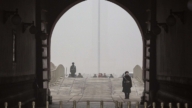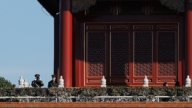【新唐人2012年12月05日訊】「十八大」前就傳出,中共會將27個國務院部委縮減到18個大部委,日前《京華時報》和各媒體報導,「十八大」閉幕後,中共當局便著手就政府機構改革方案徵集各界人士的意見。那麼,這一動作是為了減少行政費用,還是在內鬥中消減對手勢力?而這種被稱為關在「中共籠子裡的改革」,能給中國帶來實質變化嗎?真正要改的話,會遇到甚麼樣的阻力?接下來,就來聽聽民眾的心聲。
據《京華時報》11月29號報導,中共「十八大」閉幕後,當局便著手就「政府機構改革方案」徵集各界人士的意見。根據這項方案,中共政權下屬27個部門將縮減到18個,17個直屬機構將縮減到6個。另外,原屬於政府組成部門的「人民銀行」將改為獨立機構;而國家安全部降為國家安全總局;政府下屬的官方通訊社—-《新華社》將實行企業制度改革。
旅美中國民運人士蔡桂華指出,中共歷史上每次所謂的「精兵簡政」,結果都比原來的規模更加擴大,導致機構更加臃腫。
蔡桂華:「裝模作樣的做給大家看看,第一是做做樣子,樹立親政廉政的形象,它縮一縮、擴一擴,裏面都有貓膩和蹊蹺,大家在裏面可以打壓一批,甩掉一批,自己需要的時候再拉一批,又變成擴大一批。中共搞這些東西曆來像演戲一樣,我們已經過來之人看的多了。」
蔡桂華認為,胡錦濤在「十八大」上已經給中國的改革定調,所謂「不走因循守舊的老路,也不走改旗易幟的邪路。」蔡桂華說,中共一切所謂的「改革」,就是為了中共政權的穩定。
蔡桂華:「改革、不改革,不是他要考慮的,最重要的是權力的穩定。作為維穩的手段,需要改的話,對老百姓更糟糕,不是改革成有利於老百姓的國富民強的方向,它是有利於官僚體制更進一步穩固,更進一步維穩的方向改,所以這種改革是更反動、更醜陋。」
北京時政觀察人士華頗認為,「大部制」的改革意義不大。他說,國務院系統調整之後,地方政府的部門也會做出相應的調整,把部委減少,讓「協會」承擔,可是「協會」也同樣是政府的事業單位,也是需要用國家的稅收來養。
北京時政觀察人士華頗:「減少多龍治水,但也生出另一些問題。就是權力的壟斷,給當權者以更好的權力輸出的空間,而且人員也未必減少,有可能還會增加。而地方政府吃官飯、吃官糧,老百姓養的人數不少反增。」
華頗表示,中共各利益集團之間的關係旁根錯節,誰也不能輕易撼動。他說,當年改革高速公路收費的問題,就是一個很好的例子。
華頗:「只要它是動了一些人的乳酪蛋糕的話,必然就會失敗。有個例子,就是高速公路收費的問題,但是現在高速公路的收費一直不能停止,二級公路收費都是換湯不換藥,以各種名目,吃、拿、卡、要,一收費還養了一些人,隊伍越大越需要罰款收入,如果罰款收入越多,這隊伍就要越大,形成惡性循環。」
華頗還指出,中共現在還在到處打壓,不允許老百姓說話,不允許媒體自由報導,不允許民間成立社團和黨派,中共高呼「改革」,只能是騙人的幌子。蔡桂華說,中共如果有誠意改革,應該向蔣經國學習—-開放黨禁、報禁,落實民主選舉。
採訪編輯/劉惠 後製/君卓
People Not Optimistic on CCP’s Ministry-Level Reform
Rumor spread even before the 18th Congress that the CCP
(Chinese Communist Party) will cut the 27 ministries to 18.
Recently Jinghua News and other media reported,
that after the closing of the 18th Congress,
the CCP authorities have started to collect opinions
from all walks of life on reform of government institutions.
Is the goal of this action to reduce administrative costs,
or reduce opponents forces?
Will this so-called “cage reform"
bring real change to China?
What kind of resistance will it encounter?
Let’s listen to the voices of the people.
According to Jinghua News’ report from November 29,
after its 18th Congress, CCP is working on a new proposal.
The CCP authorities started collecting opinions from all
walks of live on Government Institutional Reform Proposal.
In this proposal, the 27 ministries will be reduced to 18,
17 direct subordinate agencies will be reduced to 6,
government’s People’s Bank will be changed
to become an independent business,
Ministry of National Security will be demoted
to Department of National Security,
and government news agency Xinhua
will implement an enterprise-wide reform.
Cai Guihua, U.S.’ residing Chinese pro-democracy activists,
pointed out that CCP’s so-called “streamlining” in the past always resulted in an even larger government.
Cai Guihua: “It tries to establish a false look of kindness.
There are tricks each time it shrinks or expands.
When it suppresses its opponents on the inside, it shrinks.
When it needs more resources, it expands.
We have seen many times
this type of acting by the CCP.”
Cai Guihuan thinks Hu Jintao has set the tone of a reform
during the 18th CCP’ Congress.
There he said, “Do not take the old-fashioned path,
nor the evil path that changes our flag.”
Cai Guihua suggests CCP’s so-called reform
is to strengthen its power.
Cai Guihua: “Reform or not reform is not what he considers.
What is the most important to him is stability of power.
In order to safeguard stability, the CCP will change
even if this is worse for the people.
The reform is not in favor of the people or the country,
it is beneficial to safeguard the bureaucracy system.
So such reform can only lead to a more reactionary,
and dreadful regime.”
Beijing observer Hua Po thinks the “Ministry-Level” reform
does not carry much significance.
He said that after the state-level system is adjusted,
local governments will be made to follow it.
The reduced ministry resources will be taken
by other organizations of the government.
Hua Po: “The reduction will bring other issues. Power
monopoly gives leaders more space to implement power.
The resources will not be reduced,
but rather increased.
Local government staff who consumes tax payers’ money
will also increase, instead of decreasing.”
Hua Po thinks CCP’s various interests groups,
are closely entangled.
No one can touch them at ease. He said,
the high-way toll reform before was a good example.
Hua Po: “As soon as the cheese case is touched, it will fall.
Like the high-way toll’ issue – the toll collection is still on.
Second-level road tolls changed their names,
but have not stopped.
There is a large group of people depending on the road tolls.
The larger the group is, the more fines and toll it needs;
the more fines and tolls there are,
the larger the group grows. This is a vicious cycle.”
Cai Guihua also states the CCP still carries on its suppression,
does not allow freedom of speech, free media, establishment of independent political organizations and parties.
CCP’s loud reform is only to deceive people.
If it is sincere about reform, CCP should lift the ban on
political parties and media, and allow democratic elections, concludes Cai Guihua.





























